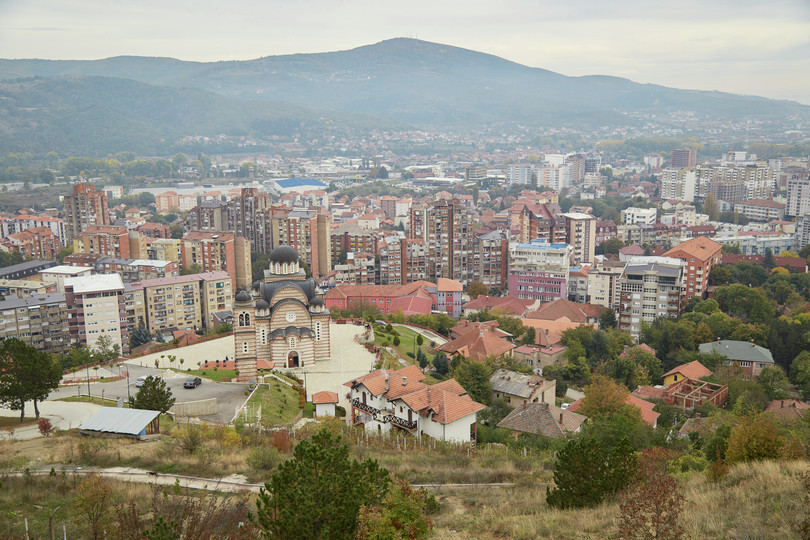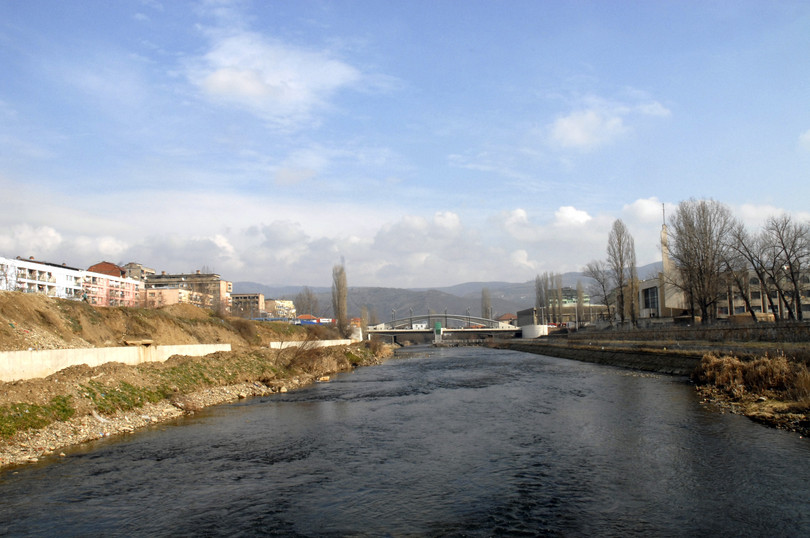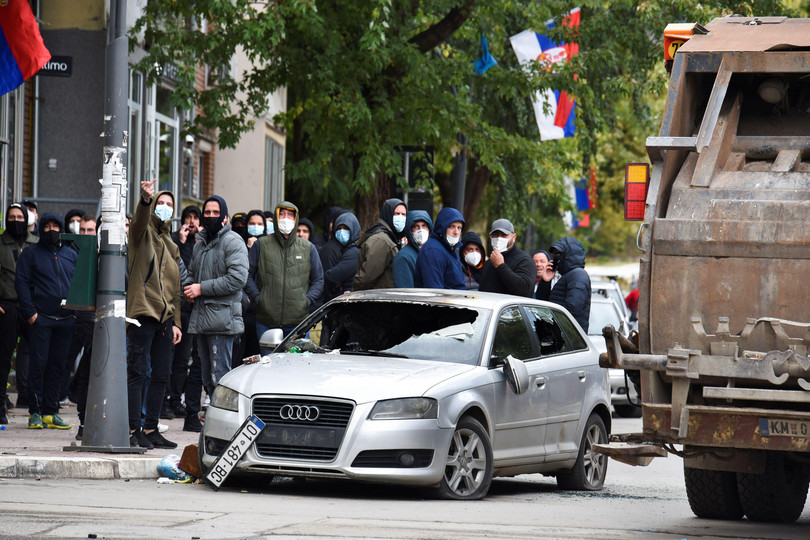Links between politics, ethnicity and organized crime in northern Kosovo.
The town of Mitrovica in northern Kosovo has often been a flashpoint for inter-ethnic tensions between ethnic Serbs and ethnic Albanians, or between the local population and the international community. Mitrovica North, as well as the municipalities of Leposavic, Zubin Potok and Zvecan in northern Kosovo (with an estimated population of 80 000),1 are also considered hotspots for organized crime.2 In October 2021, as part of a crackdown on organized crime in different parts of Kosovo, the police carried out a raid against criminal groups in the Mitrovica area that resulted in violent clashes. What are the links between politics, ethnicity and organized crime in this volatile region?
Figure 1 Mitrovica, in northern Kosovo, and its neighbouring municipalities are hotspots for organized crime in the country.
Grey economy in a grey zone
Since the end of the war in Kosovo in 1999, the northern part of the country has been divided along ethnic lines. The fault line is the Ibar river separating predominantly Serb communities in the north from Albanian ones in the south.3 For a long period, bridges spanning the river in Mitrovica were seen by Serbs as ‘symbols of resistance’ whereas Albanians regarded them as ‘symbols of unity’.4

View of Mitrovica. The city is divided between ethnic Serbs and ethnic Albanians.
Photo: Pierre Crom/Getty Images
The disputed status of the region and the existence of de facto authorities (often backed by Serbia), as well as the presence of parallel security structures has enabled a high level of de facto self-government. This has also created a permissive environment for illicit activity for Serb and Albanian traffickers.5 The region has also been considered as a good place for fugitives, for example from Serbia, to hide out.
The situation started to change in 2013 due to an agreement between Belgrade and Pristina reached in Brussels that, among other steps, dismantled the parallel security structures.6 This has given the Kosovar government and its executive structures a greater footprint in the region. Nevertheless, unresolved disputes between Pristina and Belgrade have resulted in simmering tensions that sometimes boil over. Furthermore, the lack of cooperation between Serbian and Kosovar police and judicial authorities ‘makes these bodies paralyzed and unable to fight criminals’.7
Yet tensions at the bargaining table have not stopped illicit trade under the table. Northern Kosovo is used as a buffer zone between Kosovo and Serbia for the smuggling of goods, medicines, cigarettes, alcohol and drugs. With the exception of cannabis, most goods being smuggled into the jurisdiction are licit products that are moved on small secondary roads in order to evade customs and excise taxes. Some of the trafficking is carried out by organized groups, but much of it is being done by private persons bringing in appliances, medicines, food items and alcoholic beverages from Serbia. Weak rule of law and free electricity have also reportedly made the region a lucrative hub for mining of cryptocurrencies.8 The situation deserves a more granular analysis in order to shed more light on the region’s reputation as a black hole of organized crime.
Links between organized crime and politics
Northern Kosovo receives financial support from Serbia. Furthermore, in line with the 2013 Brussels Agreement, four municipalities in the north also have access to funds from the Kosovo state budget earmarked for local self-government. On top of this financial support, the area receives funds from international donors (particularly the EU) and an additional development fund. The latter is made up of the customs paid on goods imported for consumption in northern Kosovo. However, these funds have been steadily decreasing since 2014,9 which seems to be in line with the smuggling activities described above. These funds are intended for regional development, yet there is little data on how the money is being spent.

The river Ibar separates predominantly Serb communities in the north of the country from Albanian ones in the south.
Photo: Lekic Dragan/Gamma-Rapho via Getty Images
Since there is very little industry in this region (mostly only small businesses), whoever controls public resources in this rent-seeking economy holds considerable power. Businesses depend on links to political patrons for survival. Indeed, for most people in the north, it is more profitable to gain access to public funds than to do business. This situation incentivizes corruption through clientelism and creates a political economy of dependency.
Politics in northern Kosovo is dominated by one political party, Srpska Lista, which has close links to the Serbian Progressive Party led by Serbian President Aleksander Vučić.10 The deputy head of Srpska Lista is Milan Radoičić, whose close partner is Zvonko Veselinović, a notorious Serbian businessman who has won several public contracts for construction projects and highways in Serbia and owns a well-known hotel in Kopaonik.11 In 2019, Radoičić and Veselinović were indicted for allegedly leading an organized criminal group that was responsible for the murder of rival Serb political leader Oliver Ivanović in January 2018.12 Before his death, in an interview for the Balkan Investigative Reporters Network, Ivanović described Radoičić as ‘North Kosovo[‘s] dark ruler’ and a ‘key figure in an intimidating system of power in northern Kosovo’. Ivanović further claimed that Radoičić represented an informal centre of power and decision-making over the region.
In November 2018, Kosovo police tried to arrest Radoičić in Mitrovica, but he eluded them and kept a low profile for two years.13 In early 2021, the warrant for his arrest was cancelled and he returned to Kosovo, where he was unanimously re-elected as vice president of Srpska Lista in July 2021.14
On 8 December, the US put Radoičić, Veselinović and a number of other Kosovo citizens on a blacklist, as part of its strategy for cracking down on corruption. In a statement, the US Treasury Department described Veselinović as the leader of an organized criminal group that ‘is engaged in a largescale bribery scheme with Kosovar and Serbian security officials who facilitate the group’s illicit trafficking of goods, money, narcotics, and weapons between Kosovo and Serbia’. The statement also said that he has ‘conspired with various politicians in several quid pro quo agreements, including the early 2019 bribery of Kosovar security officials to allow their smuggling operations between Serbia and Kosovo and the late 2017 bribery of Kosovar border security officials to allow safe passage for smugglers.’15

A damaged car following clashes between police and local protestors during an operation against the smuggling of goods, Mitrovica, 13 October 2021.
Photo: Reuters/Laura Hasani via Alamy
Crackdown on crime
While past governments in Pristina have been wary of taking on the political economy of northern Kosovo, the government led by Prime Minister Albin Kurti has pledged to tackle organized crime and corruption. According to Kurti, since he took office in March 2021, there have been 437 police operations that have dismantled 31 criminal groups.16
A major operation was carried out by the Kosovo police on 13 October 2021, primarily in the municipalities of Pristina, Peja, Mitrovica South and Mitrovica North.17 Media attention focused in particular on the action in Mitrovica North. The raid came against a backdrop of heightened tensions between Pristina and Belgrade following a dispute over licence plates and just before local elections on 17 October.
When Kosovo police units moved into Mitrovica, they were blocked by crowds that started shouting and throwing stones at the police officers.18 Tensions were further heightened when the municipality’s emergency alarm was activated, bringing more people into the streets. In response, the police were reinforced by more heavily armed police special operations units from the nearby ‘Belvedere’ camp in South Mitrovica.19 What was supposed to be a targeted anti-organized crime operation took on the character of a showdown between the police and angry members of the local population. Violence escalated to the point that the special operations units came under attack; a senior commander and nine other police officers (three of them ethnic Serbs) were wounded as a result of an explosion and rockets were fired against police armoured vehicles.20 A number of civilians were also injured. Several arrests were made, and police said that a number of smuggled goods and evidence worth hundreds of thousands of euros were seized.21
Although such raids support the government’s agenda to be tough on crime, they also help local forces play the nationalist card. In an open discussion between Vučić and representatives of Srpska Lista held on 16 October 2021 at the military barracks of the Serbian Army in Raska (close to the border with Kosovo), Radoičić warned that if police raids continue, ’people will organize and defend the interest of Serbs in Kosovo’.22 In short, such operations help to make Kurti’s government look tough on crime while they play into the hands of politicians and criminal groups in the subregion who profit from the status quo.
The situation in northern Kosovo continues to demonstrate the tangled links between organized crime and politics. It also features the characteristics of a hotspot of organized crime: an area where weak governance, socio-economic vulnerability and trafficking routes overlap. And it highlights how criminals have better cross-border cooperation than the police or politicians.
Notes
-
This is an estimated number because the four northern municipalities boycotted the latest census in 2011. These estimates stem from a profile of municipalities prepared by the OSCE Mission in Kosovo in 2018. OSCE, Municipal Profiles 2018, October 2018, https://www.osce.org/files/Municipal%20Profiles_2018.pdf. ↩
-
GI-TOC, Hotspots of organized crime in the Western Balkans. Local vulnerabilities in a regional context, May 2019, https://globalinitiative.net/wp-content/uploads/2019/05/Hotspots-Report-English-13Jun1110-Web.pdf. ↩
-
International Crisis Group, Kosovo’s Linchpin: Overcoming Division in Mitrovica, Balkans Report No. 96, 31 May 2000, 3, https://d2071andvip0wj.cloudfront.net/96-kosovo-s-linchpin-overcoming-division-in-mitrovica.pdf. ↩
-
Jozef Bátora et al., Spaces and institutional logics in post-conflict settings of Mitrovica, Journal of Intervention and Statebuilding, 15, 1, 114–131. ↩
-
Walter Kemp, Mark Shaw and Arthur Boutellis, The elephant in the room: How can peace operations deal with organized crime?, International Peace Institute, 3 June 2013, 46–55, https://www.ipinst.org/wp-content/uploads/2013/06/elephant_in_the_room.pdf. ↩
-
Isidora Stakic and Maja Bjelos, The Future of Civil Protection in North of Kosovo, Kosovo Centre for Security Studies and Belgrade Centre for Security Policy, 4 October 2015, https://www.balkansecurityplatform.org/Publications/354/The-future-of-Civil-Protection-in-North-Kosovo.shtml. ↩
-
Ivana Jeremić, An unexpected cooperation: Albanians and Serbs ‘Affairs’ in Kosovo, Belgrade Centre for Security Policy, 15 October 2021, https://bezbednost.org/en/publication/an-unexpected-cooperation-albanians-and-serbs-affairs-in-kosovo/. ↩
-
Adelina Ahmeti and Kreshnik Gashi, In North Kosovo, mining for Bitcoin on ‘free’ electricity, BalkanInsight, 12 May 2021, https://balkaninsight.com/2021/05/12/in-north-kosovo-mining-for-bitcoin-on-free-electricity/. ↩
-
Dragiša Mijačić, O Fondu za razvoj severa Kosova, Kim, 30 November 2020, https://www.radiokim.net/vesti/analiza/o-fondu-za-razvoj-severa-kosova.html. ↩
-
Pobeda Srpske liste 100%, gradonačelnici u 19 opština u prvom krugu, ni u jednoj LVV, Kossev, 17 October 2021, https://kossev.info/danas-su-kosovski-lokalni-izbori-biralista-se-otvaraju-u-7/. ↩
-
Od „čuvara mosta” do međunarodne poternice: Ko je Zvonko Veselinović, BBC, 2 December 2019, https://www.bbc.com/serbian/lat/srbija-50633650. ↩
-
Rada Trajković, a local Serbian politician from Kosovo, repeatedly alleged that Radoičić is behind the assassination of Ivanović. See Radoičić glavnoosumnjičeni za ubistvo Olivera Ivanovića, Radio Free Europe, 23 August 2019, https://www.slobodnaevropa.org/a/pristina-sud-radoicic-ivanovic/30125833.html. ↩
-
Three Serbs arrested in Oliver Ivanovic murder investigation, EU-OCS, 23 November 2018, https://eu-ocs.com/three-serbs-arrested-in-oliver-ivanovic-murder-investigation/. ↩
-
Pristina court withdraws warrant for Kosovo Serb List official, Kossev, 1 March 2021, https://rs.n1info.com/english/news/pristina-court-withdraws-warrant-for-kosovo-serb-list-official/. ↩
-
US Department of the Treasury, Treasury targets corruption networks linked to transnational organized crime, 8 December 2021, https://home.treasury.gov/news/press-releases/jy0519. ↩
-
Interview of Prime Minister Kurti on 7 November 2021, see Kurti: Beogradi dëshiron ta ketë një shtet në Kosovë, s’mund të ketë Asociacion, pike, Gazeta Express, 7 November 2021, https://www.gazetaexpress.com/kurti-nuk-mund-te-kete-asociacion-mbi-baza-etnike-pike/. ↩
-
DEKLARATA/ Policia e Kosovës për tensionet në Mitrovicë: Grupet kriminale kanë qëlluar me armë dhe granata, janë plagosur 6 efektivë, Dritehije, 13 October 2021, https://www.dritehije.com/2021/10/13/deklarata-policia-e-kosoves-per-tensionet-ne-mitrovice-grupet-kriminale-kane-qelluar-me-arme-dhe-granata-jane-plagosur-6-efektive/. ↩
-
For more details, see statement of the General Director of the Kosovo police, Mr Samedin Mehmeti, Drejtori i Policisë: 10 policë u lënduan në Mitrovicën Veriore gjatë aksionit kundër kontrabandimit me mallra, Shqip.com, November 2021, https://shqip.com/drejtori-i-policise-10-zyrtare-policore-u-lenduan-ne-mitrovicen-veriore-gjate-aksionitkunder-kontrabandimit-me-mallra/. ↩
-
These special intervention units are called Njësia Speciale Operative (NJSO). The NJSO is widely known in the Serbian media as the ROSU – an acronym dating from Kosovo’s period under international administration, when the special forces were called the Rapid Operational Support Unit. The unit has since been reorganized. Nevertheless, ROSU still represents a ‘force of fear’ in the eyes of many Serbs in northern Kosovo, with the unit’s negative connotation embedded in the vernacular of Serbian politicians and the narrative of Serbian media tabloids. ↩
-
For more details, see the statement of Mr Besart Ahmeti, NJSO Operational Commander, Komandanti i Njësisë Speciale, Besart Ahmeti tregon se si u plagos në aksionin kundër kontrabandës në veri, Telegrafi, 3 November 2021, https://telegrafi.com/komandanti-njesise-speciale-besart-ahmeti-tregon-se-si-u-plagos-ne-aksionin-kunder-kontrabandes-ne-veri/. ↩
-
Bekim Shehu, BE reagon për tensionet në veri të Kosovës, Deutsche Welle, 13 October 2021, https://www.dw.com/sq/be-reagon-p%C3%ABr-tensionet-n%C3%AB-veri-t%C3%AB-kosov%C3%ABs/a-59497238. ↩
-
For more on the Raska meeting, see Vučić sa Srbima u Raški: Čuvaćemo mir, ako krene nasilje zaštitite narod, N1, 13 October 2021, https://rs.n1info.com/vesti/vucic-kosovo-sever-policija-akcija-srbi-albanci/. While the meeting was broadcast live, Radoičić made his intervention publicly alongside other members of Srpska Lista. ↩
